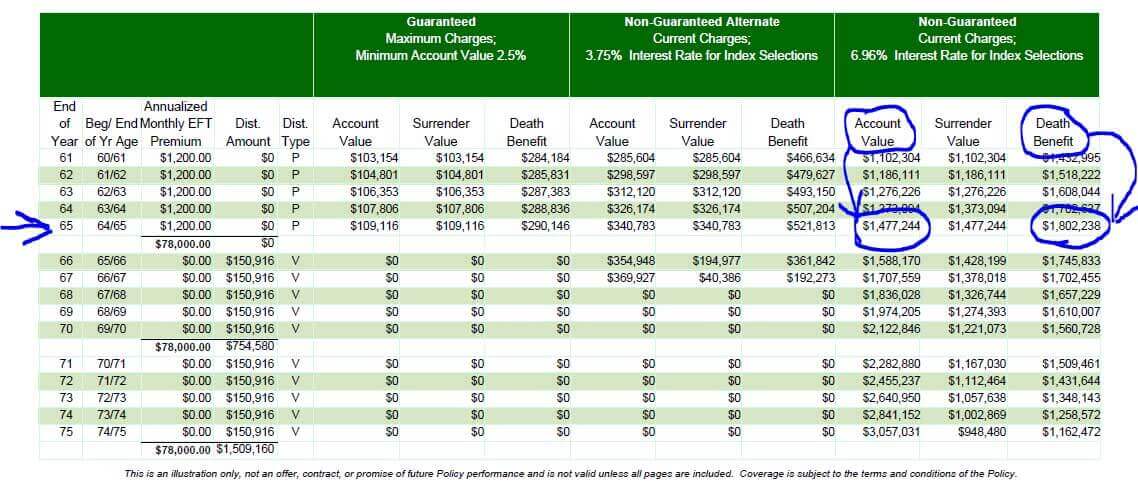All Categories
Featured
Table of Contents
Do they compare the IUL to something like the Lead Overall Supply Market Fund Admiral Shares with no load, a cost proportion (ER) of 5 basis factors, a turnover ratio of 4.3%, and a remarkable tax-efficient record of circulations? No, they compare it to some awful proactively taken care of fund with an 8% tons, a 2% ER, an 80% turn over ratio, and an awful record of temporary capital gain circulations.
Shared funds usually make annual taxable distributions to fund owners, also when the value of their fund has actually decreased in worth. Shared funds not only need revenue reporting (and the resulting yearly taxes) when the shared fund is rising in worth, but can additionally enforce income taxes in a year when the fund has gone down in value.
You can tax-manage the fund, harvesting losses and gains in order to reduce taxed circulations to the investors, but that isn't somehow going to alter the reported return of the fund. The ownership of mutual funds might require the common fund proprietor to pay projected tax obligations (financial foundation index universal life).

IULs are simple to position so that, at the proprietor's fatality, the recipient is exempt to either income or inheritance tax. The very same tax obligation reduction methods do not work almost too with mutual funds. There are various, typically expensive, tax catches linked with the moment purchasing and selling of common fund shares, catches that do not relate to indexed life Insurance.
Possibilities aren't very high that you're mosting likely to be subject to the AMT because of your shared fund circulations if you aren't without them. The rest of this one is half-truths at ideal. For example, while it is true that there is no income tax obligation as a result of your successors when they inherit the proceeds of your IUL policy, it is likewise true that there is no earnings tax obligation because of your beneficiaries when they acquire a common fund in a taxed account from you.
Equity Indexed Life Insurance
The federal inheritance tax exception restriction mores than $10 Million for a couple, and expanding yearly with rising cost of living. It's a non-issue for the vast majority of physicians, much less the remainder of America. There are far better ways to stay clear of inheritance tax issues than purchasing investments with reduced returns. Common funds might trigger revenue taxes of Social Safety benefits.

The growth within the IUL is tax-deferred and might be taken as tax obligation free earnings via finances. The policy proprietor (vs. the mutual fund supervisor) is in control of his/her reportable income, hence allowing them to minimize or perhaps eliminate the taxes of their Social Security advantages. This is excellent.
Below's an additional minimal issue. It's true if you buy a mutual fund for state $10 per share right before the distribution day, and it disperses a $0.50 distribution, you are after that mosting likely to owe tax obligations (most likely 7-10 cents per share) despite the fact that you have not yet had any kind of gains.
In the end, it's actually regarding the after-tax return, not exactly how much you pay in taxes. You are mosting likely to pay even more in taxes by utilizing a taxable account than if you purchase life insurance policy. Yet you're likewise probably going to have more money after paying those taxes. The record-keeping requirements for owning shared funds are substantially extra complex.
With an IUL, one's documents are kept by the insurance business, copies of yearly statements are mailed to the owner, and circulations (if any kind of) are completed and reported at year end. This set is likewise sort of silly. Naturally you should maintain your tax records in instance of an audit.
Benefits Of Iul
Rarely a reason to purchase life insurance coverage. Shared funds are typically part of a decedent's probated estate.
Additionally, they go through the delays and expenditures of probate. The earnings of the IUL plan, on the other hand, is constantly a non-probate distribution that passes beyond probate directly to one's named recipients, and is for that reason exempt to one's posthumous creditors, unwanted public disclosure, or comparable hold-ups and expenses.
Medicaid disqualification and lifetime earnings. An IUL can provide their owners with a stream of revenue for their entire life time, regardless of how long they live.

This is valuable when arranging one's affairs, and transforming assets to revenue prior to a retirement home arrest. Common funds can not be converted in a similar manner, and are often thought about countable Medicaid possessions. This is an additional foolish one advocating that inadequate individuals (you understand, the ones that require Medicaid, a federal government program for the inadequate, to spend for their nursing home) ought to make use of IUL rather than common funds.
What Is Equity Indexed Universal Life Insurance
And life insurance policy looks terrible when contrasted fairly against a pension. Second, people who have cash to get IUL over and past their pension are going to have to be awful at handling money in order to ever before get approved for Medicaid to pay for their nursing home expenses.
Chronic and terminal ailment biker. All plans will enable an owner's very easy access to cash money from their plan, commonly waiving any kind of abandonment penalties when such people suffer a serious disease, need at-home care, or end up being confined to a retirement home. Common funds do not provide a similar waiver when contingent deferred sales fees still put on a shared fund account whose proprietor requires to offer some shares to fund the expenses of such a remain.
Universal Benefits Corporation
Yet you reach pay even more for that benefit (biker) with an insurance plan. What a large amount! Indexed universal life insurance policy gives death benefits to the recipients of the IUL owners, and neither the owner neither the recipient can ever before shed money as a result of a down market. Mutual funds give no such guarantees or death advantages of any kind.
I definitely do not need one after I reach economic freedom. Do I want one? On standard, a purchaser of life insurance coverage pays for the true price of the life insurance policy benefit, plus the prices of the plan, plus the earnings of the insurance policy business.
Universal Benefits Corporation
I'm not totally certain why Mr. Morais threw in the entire "you can't lose money" once again right here as it was covered fairly well in # 1. He simply wished to repeat the most effective selling factor for these points I intend. Once more, you don't lose nominal dollars, yet you can lose real dollars, as well as face severe chance price as a result of reduced returns.

An indexed universal life insurance policy owner might exchange their policy for an entirely different policy without causing income tax obligations. A common fund owner can stagnate funds from one mutual fund company to an additional without marketing his shares at the former (hence causing a taxable event), and buying brand-new shares at the latter, usually subject to sales charges at both.
While it holds true that you can exchange one insurance policy for another, the reason that people do this is that the initial one is such a horrible policy that also after purchasing a new one and going through the very early, adverse return years, you'll still appear in advance. If they were offered the best plan the very first time, they shouldn't have any kind of wish to ever before trade it and experience the early, adverse return years once more.
Latest Posts
Insurance Indexing
Universal Life Quotes Online
Universal Life Quotes